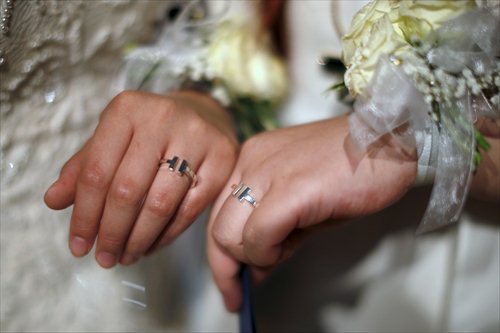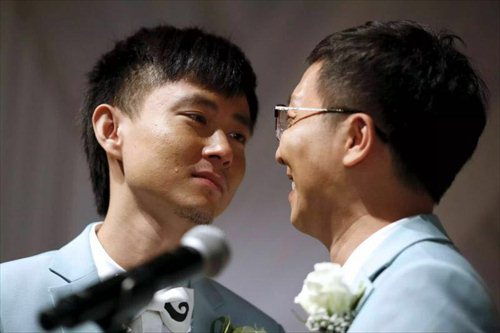The Shanghai same-sex couples who were wed in the US talk about life and love

Seven same-sex couples from China get married in the US last year though their marriages are not officially recognized back home .Photo: CFP
Li Tao (left) and Duan Rongfeng at their marriage ceremony in the US Photo: Courtesy of Duan Rongfeng
After the US Supreme Court legalized same-sex marriages in 2015, hundreds of same-sex couples have been applying to be married there. Although same-sex marriages are not recognized in China this has not stopped Chinese gay couples from wanting to get married. Some have found an alternative by getting married in countries that have legalized same-sex marriages.
On June 9, 2015 just before the Supreme Court ruling was delivered, seven Chinese gay couples were married in Los Angeles. The Global Times talked to three of the couples at an event organized at the Shanghai American Center last week.
Jerry and Emil were college classmates who became lovers in 2002. They have been together for 14 years. Late in 2014, Emil spotted an online competition organized by Alibaba and the Chinese gay mobile app, Blued. By uploading photographs and videos to the website and gathering votes, couples had a chance of winning a trip to the US and getting married in Los Angeles.
Emil and Jerry have not publicly come out and their families and most of their friends have no idea they are gay.
Taking the risk
"At the time, our only concern was being discovered. We were very uncertain about uploading our videos and photos," said Emil. But they really wanted to marry in the US. In the end, they decided to take the risk. After uploading their carefully created photos and videos they asked every friend they trusted to vote for them and finally they won and became one of the 10 couples heading to the US to get married.
Three of the 10 missed the flight to the US because of visa problems. But Jerry and Emil flew from Shanghai to Los Angeles on June 5 with two other couples. Another four left from Beijing.
"When we got off the plane, there were already media waiting for us at the airport. We were pretty nervous at the time. It was the first time that we had been interviewed by the media," Emil said.
The next few days were packed with sightseeing and social activities with the gay community in LA. On June 9, the seven couples were actually married and after formalities they found themselves at a small celebration ceremony at a local library.
"When we got to the library, we were astonished. The room was full of local and international media, including CNN and ABC. There were several other couples like us who had not told their families about getting married yet. We were frightened," said Emil.
The joy of getting married was being overtaken by the fear of being discovered. "I thought, this is going to be too big. We didn't expect that it would be such a big event," said Emil. But realizing that the organizers had spent so much time and money on the event, Emil undertook the interviews. Even before they went on to the stage to accept their marriage licenses, the news had been already uploaded online and then reposted by Chinese media. Suddenly, all of the couples were getting urgent phone calls from China - from friends who knew about it and from friends who were just learning about it.
"It got out of control. We were scared and really worried. We were shaking all over," said Emil. The joy of getting married and the stress of the media coverage turned the day into something quite different to the one they had expected.
However most of Emil and Jerry's friends were completely supportive and told them how much they admired their courage.

Not an easy decision
Duan Rongfeng and Li Tao met each other 11 years ago through an online forum and they have lived together for nine years. But getting married was not an easy decision.
"We did think about getting married. But everyone in the LGBT (lesbian, gay, bisexual and transgender) community knows that it's not possible in China. We could apply to get married in another country but if we aren't looking to immigrate there it's not necessary," Duan said. "It was our dream that one day we would have a ceremony and receive blessings from families and friends. But we hadn't thought about getting married in the US before we learned about the competition."
Duan and Li came out in 2014 - inspired by one of Li's cousins who was also gay. With help from PFLAG China (Parents, Families and Friends of Lesbians and Gays) , an organization that helps LGBT people communicate with relatives and find acceptance, the cousin told his parents he was gay. His parents not only accepted this, but welcomed his boyfriend spending time at their home. For Duan and Li this was a life to be dreamed of.
In the summer of 2014, they invited Li's mother to Shanghai where they told her they were gay - with help from their cousin's mother who is now a volunteer from PFLAG China. Subsequently they have all become PFLAG volunteers.
Nowadays Duan works hard to promote acceptance of gays by their friends and relatives. He believes that because Chinese people are less influenced by Western religions, there are less extreme opinions about LGBT people. And having experienced the Cultural Revolution (1966-76), the reform and opening-up policy, and the technological advances in China, older Chinese are more flexible about accepting new things.
"Chinese parents have had little exposure to the LGBT community in the past. So they rejected them because of fear and ignorance. But when they get to know more, they can deal with their emotions better than Western parents," Duan said.
Duan's parents have not completely accepted his gay identity. "I told my parents when I was younger. But both of us avoid talking about it. I think that they might know about us getting married from the Internet, but they haven't talked to me about it," Duan said. "I'm still trying. Now there's less pressure to tell them, but if we want to have children in the future, we would want our parents to know and bless us."
Life didn't change a lot after Duan and Li got married but it did become an important milestone in their lives. "The marriage day was an important day in our lives. It was not about us personally because of the media coverage. Since then we have often been asked for interviews and to talk about the experience," Duan said.
Last November, Duan and Li visited the US again, this time at the invitation of Glaad.org, a non-governmental media monitoring organization founded by LGBT people. They were the first Chinese gay couple to be invited to the GLAAD Gala.
No proper ceremony
Xiaoxin and Xiaotao chatted to each other on Sina Weibo and then actually met at a friend's party in 2012. Xiaotao had come out in 2010, and Xiaoxin came out in 2012. Their families have completely accepted them.
After being together for three years, they wanted to hold a small reception and invite friends and families to celebrate their life together. Although it's six months since they were married in the US they are still yet to have their wedding ceremony.
"For one thing, Chinese law still does not recognize our marriage. An official reception doesn't seem appropiate," Xiaoxin said. "We now think that when the day comes that China legalizes same-sex marriages, we will apply immediately and then host our own wedding ceremony."
Although their marriage is not recognized by Chinese law and Chinese society, it is recognized by all the countries that have approved same-sex marriages. "After taking the vows, we are not just in a casual relationship anymore. We feel that we are a family now," said Xiaoxin.
Xiaoxin and Xiaotao have bought an apartment in Shanghai, and they will move in their new home after Chinese New Year. Because they are not recognized in China as a couple, they cannot buy the house as a couple - but this doesn't concern them greatly. There could be other legal problems when they want to have children or when they age. They hope that China will eventually legalize same-sex marriages.
Xiaotao's father is a retired civil servant and he has written to members of the Chinese National People's Congress proposing that same-sex marriages be legalized. He needs 30 representatives to support the motion before it can be submitted and debated at the National People's Congress but, to date, few have responded.
All the three US-married couples hope that same-sex marriages will be legalized one day in China. But they know that it will be a long and hard process.
It took many decades to legalize same sex-marriages in the US. In China, only in recent years have media and the public begun to discuss LGBT topics.
"We don't expect the legalization process in China to be fast. But I still want to see same-sex marriages legalized in my lifetime," Xiaoxin said.
Newspaper headline: Married – but not in China